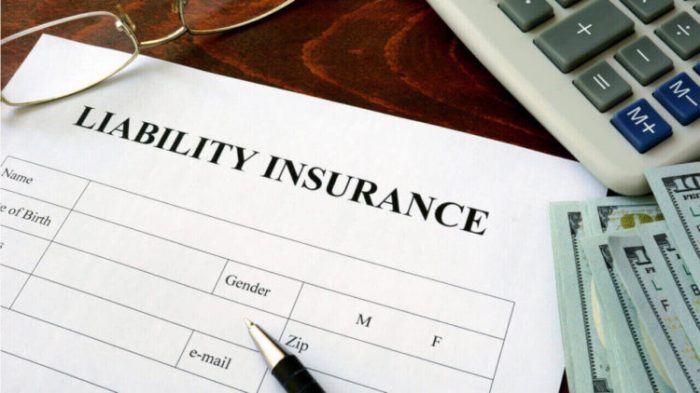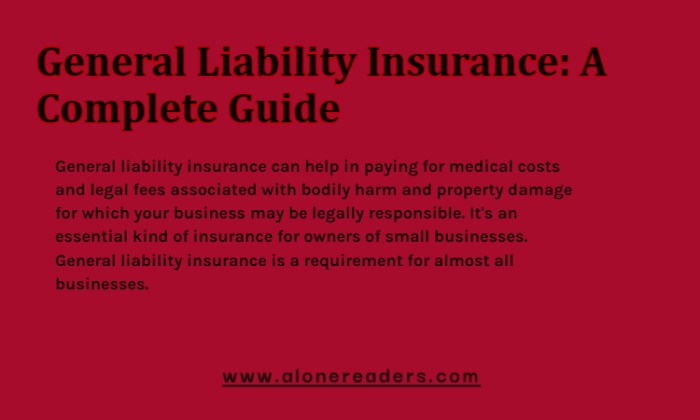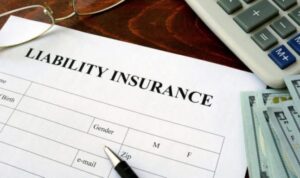Liability insurance guide sets the stage for this enthralling narrative, offering readers a glimpse into a story that is rich in detail with American high school hip style and brimming with originality from the outset.
Get ready to dive into the world of liability insurance, where protection meets style in a way that’s uniquely informative and engaging.
Introduction to Liability Insurance
Liability insurance is a type of coverage that protects individuals and businesses from the risk of being held legally responsible for injuries, damages, or negligence that result in financial loss to others. It serves as a crucial safeguard against potential lawsuits and claims that can arise from accidents or incidents where the insured party is found liable.
Importance of Liability Insurance
- Provides financial protection: Liability insurance helps cover legal expenses, court costs, and settlement payments in the event of a liability claim or lawsuit.
- Preserves personal and business assets: Without liability insurance, individuals and businesses may be forced to pay out of pocket for damages, putting their assets at risk.
- Promotes peace of mind: Knowing that you have liability insurance can offer peace of mind by mitigating the financial risks associated with legal liabilities.
Scenarios where Liability Insurance is Essential
- Car accidents: Liability insurance for vehicles can cover damages to other parties’ vehicles or injuries to individuals in the event of an accident where the insured driver is at fault.
- Professional services: Professional liability insurance, also known as errors and omissions insurance, protects businesses and individuals in case of claims related to professional services or advice provided.
- Property damage: Liability insurance can provide coverage for accidental damage caused by the insured party to someone else’s property, such as a broken window or water damage in a rented apartment.
Types of Liability Insurance: Liability Insurance Guide
Liability insurance comes in various forms to protect individuals and businesses from potential financial losses due to legal claims. Here are some common types of liability insurance:
General Liability Insurance
General liability insurance provides coverage for third-party claims related to bodily injury, property damage, and advertising injury. It is essential for businesses to protect themselves from lawsuits arising from accidents or negligence.
- Example: A retail store owner may need general liability insurance to cover medical expenses if a customer slips and falls on the premises.
Professional Liability Insurance
Professional liability insurance, also known as errors and omissions insurance, protects professionals from claims of negligence or inadequate work. It is crucial for individuals in professions that provide services or expertise.
- Example: Doctors, lawyers, and consultants often carry professional liability insurance to protect themselves from malpractice claims.
Product Liability Insurance
Product liability insurance covers businesses that manufacture, distribute, or sell products in case a product causes harm or injury to a consumer. It helps mitigate the financial risks associated with product-related lawsuits.
- Example: A toy company may have product liability insurance to cover legal expenses if a toy is found to be defective and causes harm to a child.
Factors to Consider When Choosing Liability Insurance
When choosing liability insurance, there are several key factors that individuals or businesses should take into consideration to ensure they have the right coverage in place to protect their assets and finances.
Coverage Limits
- It is important to assess your potential liability risks and choose coverage limits that adequately protect you in case of a lawsuit or claim.
- Higher coverage limits may offer more protection but can also result in higher premiums.
- Make sure you have enough coverage to protect your assets and future earnings.
Deductibles
- Deductibles are the amount you must pay out of pocket before your insurance coverage kicks in.
- Choosing a higher deductible can lower your premiums, but you must be prepared to cover that amount if a claim arises.
- Consider your financial situation and ability to pay the deductible when selecting your policy.
Premiums
- Premiums are the amount you pay for your insurance coverage.
- Shop around and compare premiums from different insurers to find the best value for your coverage needs.
- Consider factors such as your risk profile, claims history, and the level of coverage when evaluating premiums.
Policy Exclusions and Limitations, Liability insurance guide
- It is crucial to understand the exclusions and limitations of your liability insurance policy.
- Exclusions are specific situations or events that are not covered by your policy.
- Limitations are restrictions on the amount of coverage provided for certain types of claims.
- Review your policy carefully to ensure you are aware of any exclusions or limitations that may impact your coverage.
How to Purchase Liability Insurance

When it comes to purchasing liability insurance, there are a few key steps to keep in mind to ensure you get the right coverage for your needs. Whether you decide to work with an insurance agent, a broker, or explore online platforms, understanding the process can help you make an informed decision.
Working with Insurance Agents
- Insurance agents work for specific insurance companies and can provide you with quotes and information about the policies offered by their company.
- They can help you understand the coverage options available and assist you in selecting a policy that aligns with your needs.
- Insurance agents can also explain the terms and conditions of the policies, making it easier for you to make a decision.
Engaging with Insurance Brokers
- Insurance brokers work with multiple insurance companies and can offer you a range of options from different providers.
- They act as intermediaries between you and the insurance companies, helping you find the best policy at the most competitive price.
- Brokers can help you navigate the complex world of insurance and assist you in customizing a policy that suits your specific requirements.
Exploring Online Platforms
- Online platforms provide a convenient way to compare quotes from various insurance companies without leaving your home.
- You can easily input your information and receive multiple quotes, allowing you to see different coverage options at a glance.
- Make sure to research the reputation of the online platform and verify that they are legitimate before providing any personal information.
Remember to compare quotes from different sources to ensure you are getting the best deal.
Negotiating and Customizing Policies
- Don’t be afraid to negotiate with insurance agents or brokers to see if you can get a better rate or additional coverage.
- You can also customize your policy by adding or removing certain coverage options based on your specific needs.
- Make sure to review the terms and conditions carefully before finalizing your policy to avoid any surprises in the future.
Claims Process for Liability Insurance

When it comes to filing a liability insurance claim, there are specific steps that need to be followed to ensure a smooth process. Understanding what documentation is required and how insurance adjusters evaluate and settle claims can make a significant difference in the outcome of your claim.
Filing a Liability Insurance Claim
- Notify your insurance company: The first step is to inform your insurance provider about the incident that led to the claim. This should be done as soon as possible to initiate the claims process.
- Gather necessary documentation: To support your claim, you will need to provide relevant documentation such as incident reports, witness statements, medical records (if applicable), and any other evidence related to the claim.
- Cooperate with the insurance adjuster: An insurance adjuster will be assigned to evaluate your claim. It is essential to cooperate with them, provide accurate information, and answer any questions they may have during the investigation.
- Evaluation and settlement: The insurance adjuster will assess the information provided, determine liability, and negotiate a settlement based on the coverage of your policy and the extent of the damages or injuries incurred.
- Resolution: Once the evaluation is complete, and a settlement is reached, the claim will be closed, and you will receive compensation for the covered damages or losses.
Importance of Reviewing and Updating Liability Insurance
Regularly reviewing and updating liability insurance policies is crucial to ensure proper coverage for your business or personal needs.
Changes in business operations or personal circumstances can significantly impact the level of liability risk you face, making it essential to adjust your insurance accordingly.
Significance of Regular Reviews
- As your business grows or changes, your liability risks may increase, requiring higher coverage limits.
- Changes in industry regulations or legal requirements can also impact your insurance needs, necessitating policy updates.
- Reviewing your liability insurance regularly helps to identify gaps in coverage and ensure you are adequately protected.
Best Practices for Updating Policies
- Work with your insurance agent to assess your current coverage and determine if any adjustments are needed.
- Consider obtaining additional coverage options such as umbrella policies to provide extra protection against unforeseen risks.
- Keep detailed records of any changes in your business operations or personal circumstances that could affect your liability risks.
- Compare quotes from different insurance providers to ensure you are getting the best coverage at a competitive price.


